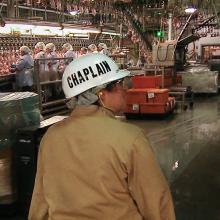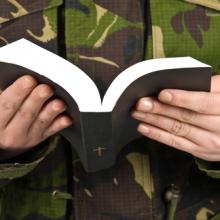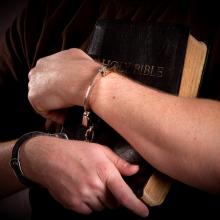chaplains
“Nine times out of 10, we’ll just be greeting people and passing out water and snacks,” said Billy Michael Honor, who directs Loose the Chains, the faith engagement initiative of The New Georgia Project “But in the event that something does happen, it’s good to have people there who know how to lead people in situations of conflict or crisis.”

Image via Journey Films / RNS
They can be found on the battlefield, at a chicken-processing plant, and behind the locked gates of a prison.
They are chaplains, and as a two-hour, two-part documentary airing on PBS stations beginning Nov. 3 points out, they minister to people of all religions and none in places where they work and live.
“Their ministry really does bring them into some of the most extraordinary places where people are in crisis and need,” said Journey Films producer/director Martin Doblmeier in an interview.
Many of the country’s most prestigious universities have hired Muslim chaplains in recent years to offer spiritual support to their Muslim students. Middlebury College, one of America’s oldest liberal arts schools, outmatched them all.
The small rural Vermont school hired Beau Latif Scurich and his wife, Naila Baloch, in the summer of 2014 to share the full-time Muslim chaplaincy position.
The 30-somethings, who were previously chaplains at Tufts and Northeastern universities, are the first married couple to share a full-time Muslim chaplaincy position at a U.S. college.
Chaplains who are part of the Army’s first line of defense against suicide say they need more training in how to prevent soldiers from killing themselves, according to a Rand Corp. survey published online April 7.
Nearly all the chaplains and chaplain assistants surveyed said they have dealt with suicidal soldiers, and most said they encourage troubled soldiers to get help. Because of confidentiality, roughly half said they would be reluctant to alert someone in the chain of command about the soldier, and roughly a third said they would not call a crisis hotline for the GI.
In addition, the study found that chaplains and chaplain assistants hold some of the same negative views about therapy that often discourage soldiers from seeing a behavioral health specialist. Most in the survey agreed that service members who seek help for suicidal thoughts would be seen differently by their peers. About half said they would be embarrassed.
Researchers said they believe this may be why chaplains are reluctant to intervene when a soldier comes to them with signs of suicidal thinking.
Lawmakers peppered Pentagon officials on Wednesday about claims that military chaplains have faced discrimination for their beliefs, and time and again, chaplains and personnel officials said they were unaware of any bias.
Virginia Penrod, deputy assistant secretary of defense for military personnel policy, told the House Subcommittee on Military Personnel that she could not cite specific instances where chaplains had to preach a sermon or oversee a ceremony that conflicted with their beliefs.
“There’s absolutely nothing in policy or code that prohibits a chaplain from praying according to the dictates of their faith,” she said.
House lawmakers late Tuesday approved an amendment to a Pentagon spending bill to prevent the appointment of nonreligious military chaplains.
The amendment, sponsored by Rep. John C. Fleming, R-La., requires that only religious organizations be permitted to endorse chaplains for the military.
“The amendment holds the military to its current standards on endorsing agencies, which must be recognized religious and faith-based organizations,” said Fleming’s spokesman, Doug Sachtleben.
If Jason Heap has his way, he’ll trade his Oxford tweeds for the crisp whites of a newly minted U.S. Navy chaplain.
“This is my chance to give back to my country,” said Heap, 38. “I want to use my skills on behalf of our people in the service. Hopefully, the Navy will see where I can be useful.”
But Heap’s goal is not assured. He fits the requirements — with master’s degrees from both Brite Divinity School and Oxford University. His paperwork is complete. He passed the physical tests and has been interviewed by a Navy chaplain. The only thing he does not have is an endorsement from a religious organization approved by the Navy.
Since state legislators were taken over by the Koch brothers, many progressive clergy have spent our entire discretionary accounts on travel to our state capitals. We attend on behalf of equal marriage, the living wage, campaign finance reform, fracking, or low wage workers. While trying to be faithful, we are, also, in the great words of Joseph Sittler, “macerated” by our citizen involvements.
But an experiment is occurring in North Carolina to de-macerate and reunite our spiritual souls with our political bodies. Instead of episodic lobbying, on Moral Mondays, clergy visit with their representatives as chaplains. They change the language from the pragmatics of the political to the hope of our God. They pass through the wilderness of the secular and its optimism and arrive at the land of hope. They talk about the downtrodden in meaningful ways with state legislators.
As friends and families reel from the news that 19 elite firefighters died battling an Arizona wildfire Sunday, the work of some of their spiritual comrades has just begun. Fire chaplains are stepping up to support the grieving, just as they did after 9/11 and the recent fertilizer plant explosion in West, Texas.
“What we do is we come alongside the survivors,” said Chaplain Jimmie Duncan, president of the Texas Corps of Fire Chaplains. “Sometimes we’re quiet. Sometimes we hug them. Sometimes we pray. … We just stand there with them and try to meet their needs and walk alongside them through the darkest part of their lives.”
Duncan is the associate director of the South Central Region of the 700-member Federation of Fire Chaplains. About half of the chaplains in the federation are ministers, and half are firefighters who have trained to become chaplains. Their everyday duties are similar to that of other pastors — visiting sick firefighters, providing basic counseling and praying at civic events and fire department ceremonies.
But officially notifying a loved one who just lost a firefighter is “absolutely one of the toughest things we ever do,” said Duncan, who spoke at the April memorial service for the West firefighters and sat next to first lady Michelle Obama.
“Not only do we have to tell them that their loved one was dead but we weren’t able to do anything to prevent that. It’s very tough for us as firefighters to have that to do,” he said.
During the July 1-3, 1863 Battle of Gettysburg, there were Christians and Jews on both sides of the conflict who knew the answer to the question “Whose side is God on?”
Or at least they thought they did.
In 1861, Confederate President Jefferson Davis declared: “Our cause is just and holy,” and the South self-assuredly adopted as its motto Deo vindice (“God will vindicate us”). In the same year, Julia Ward Howe composed the “Battle Hymn of the Republic” with the triumphant words: “He hath loosed the fateful lightning of His terrible swift sword. … I have seen Him in the watch-fires of a hundred circling camps. … Glory, glory Hallelujah, His truth is marching on.”
Two days after the Boston Marathon bombings, Boston Medical Center chaplain Sister Maryanne Ruzzo was checking on staffers who’d been caring for the injured when she received a page. A bombing victim wanted to see her.
The bedside was fraught with worry. A woman in her 30s had lost a leg to amputation as surgeons deemed it unsalvageable. Still suffering multiple injuries, she was now heading into surgery again, knowing she might wake up with no legs at all.
Ruzzo stood among the woman’s parents and siblings and did what she does best: listen. She heard their fears, including concern for the woman’s husband, who was being treated at a different hospital and who also might lose a leg to amputation. Then she prayed.
“Other people might not want to feel the pain and say, ‘Oh, it’s going to be fine,’” said Ruzzo, the Archdiocese of Boston’s coordinator of Catholic services at BMC. “We just try to be present and listen to them. … I prayed for the surgeons and the nurses.”
In a week when Boston hospitals cared for more than 170 bomb victims, staff chaplains were suddenly in great demand. They moved calmly from emergency departments to waiting rooms and employee lounges, offering a compassionate ear and much-needed comfort to anxious patients, family members and staffers.
A 600-foot footrace was the only athletic event at the first Olympics, a festival held in 776 B.C. and dedicated to Zeus, the chief Greek god.
For the next millennium, Greeks gathered every four years in Olympia to honor Zeus through sports, sacrifices and hymns. The five-day festival brought the Greek world together in devotion to one deity.
What began in ancient Greece as a festival to honor a single god, Zeus, has now become an almost Olympian task, as organizers of the games navigate dozens of sacred fasts, religious rituals and holy days.
The London Olympics will try to accommodate religious athletes with 193 chaplains, a prayer room in every venue and a multifaith center in the Olympic Village.
Athletes at the ancient Olympics believed their training honored the gods, and victory was a sign of favor from a deity. As contests like wrestling, boxing, and horse racing were added to the Olympic roster, they supplemented devotional sacrifices, hymns, and ceremonies.
“The idea was that you were training to please Zeus. But part of the festival would be to visit the temple, visit the cult statues, making offerings, celebrating and seeing your family,” said David Gilman Romano, a professor of Greek archaeology at the University of Arizona.
The combination of Greek sport and worship led the Roman Emperor Theodosius I, a Christian, to ban the Olympics in 393 A.D.
The long-smoldering debate at the U.S. Air Force Academy over the role of religion in cadets' lives has reignited, just as a new class arrives on campus for basic training.
Accusations of improper proselytizing on the Colorado Springs, Colo., campus have been challenged by those who argue that AFA guidelines curtail religious expression.
The two sides recently clashed over a letter from 66 House Republicans urging Defense Secretary Leon Panetta to investigate the USAF’s growing “hostility toward religious freedom” under guidelines set last September by USAF Chief of Staff Gen. Norton Schwartz.
In response to allegations of proselytizing, Schwarz mandated that only chaplains could endorse religious programs.
Religious conversions are on the rise in American prisons, according to a recent national survey of chaplains by the Pew Forum on Religion and Public Life.
A majority of 730 chaplains surveyed say that inmates are switching religions a lot (26 percent) or some (51 percent, and the largest gains are Muslim (51 percent), Protestant (47 percent) and pagan or earth-based religions (34 percent).
But it is difficult to determine prisoners' motivations for converting, according to Cary Funk, senior researcher for the Pew Forum.
“Some of the switching may be short-lived,” Funk said, adding that it is unclear whether the conversions are based on authentic beliefs or access to certain privileges such as special food or religious holidays.












